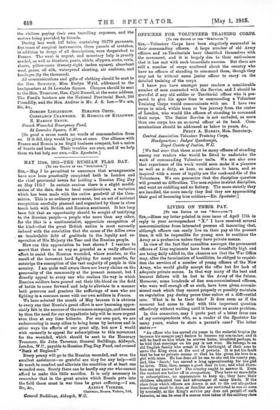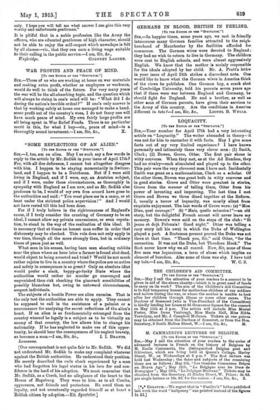LIVING ON THEIR PAY.
[To rigs Banos or rim ..iirscrsros.'1 Snt,—Since my letter printed in your issue of April 17th in reply to your correspondent " X." I have received several communications from interested persons all lamenting that, although officers can easily live on their pay at the present time, it will be impossible for young men to continue the Army as a profession unless they have private means.
In view of the fact that casualties amongst the permanent officers of Line regiments have been so dreadfully high and are being daily added to, the chances are that the War Office may, after the termination of hostilities, be obliged to requisi. Son the services of a number of young officers of the New Army, who would gladly accept the offer but for lack of adequate private means. In that way many of the beet and keenest fellows will be lost to the Army of the future. Moreover, some hundreds of fine non-commissioned officers, who were well enough off as such, have been given commis- sioned rank which they cannot properly or possibly maintain on regulation pay during peace time unless at a differential rate. What is to be their fate? It does seem as if the moment had come to deal with this important question effectively without waiting until it becomes an acute problem.
In this connexion, may I quote part of a letter from one of my correspondents who, as a reader of the Spectator for many years, wishes to state a parent's case? The letter states
officer who has served six years in the malarial tropics (to increase his meagre pay) desires to become my son-in-law, and it will be hard on him when he arrives home, invalided perhaps, to be told that marriage on his pay is not wise. He belongs to an old English family who count it the birthright of their sons to serve the King even at the cost of poverty. It is not his fault that he has no private means or that he has given his love to a girl with none. He has done all he can to eke out his scanty pay, and, like ' Jacob,' has served a long apprenticeship for the girl he loves. This, then, means a good deal to her ; and what there- fore can my answer be? The country ought to answer it. Even the rankers are better off in comparison. They have no mess-bills or subscriptions, no appearances to keep up ; they have their children educated free and advantages of many kinds. If the class from which officers are drawn is not to die out altogether something must be done, as families are restricted to one or none by necessity, as the King's service pay does not permit of such luxuries, as can be seen if a census were taken of the military class
only. I hope you will tell me what answer I can give this very worthy and unfortunate gentleman."
It is pitiful that in a noble profession like the Army the officers, who are educated gentlemen of high character, should not be able to enjoy the self-respect which nowadays is felt by all classes—viz., that they can earn a living wage suitable to their calling in the public service.—I am, Sir, &c.,



































 Previous page
Previous page